外研版英语七年级下册Module 11 Body language过关训练课件47张
文档属性
| 名称 | 外研版英语七年级下册Module 11 Body language过关训练课件47张 |  | |
| 格式 | pptx | ||
| 文件大小 | 198.6KB | ||
| 资源类型 | 教案 | ||
| 版本资源 | 外研版 | ||
| 科目 | 英语 | ||
| 更新时间 | 2022-04-06 12:42:32 | ||
图片预览


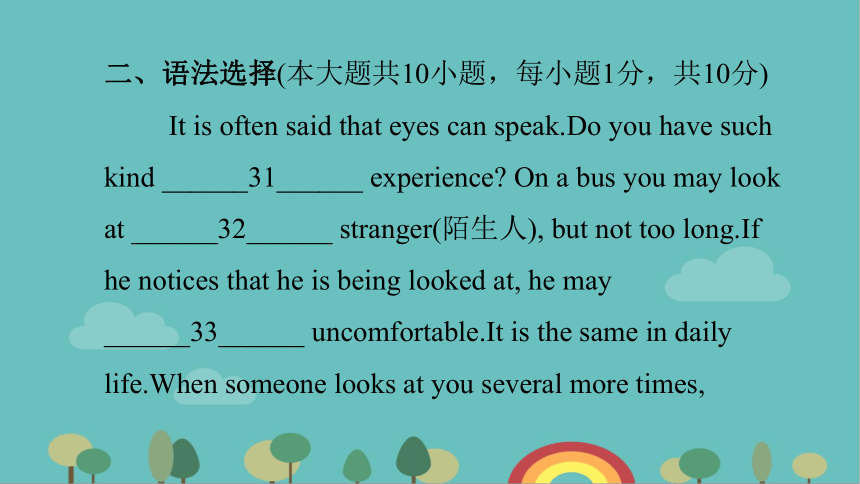
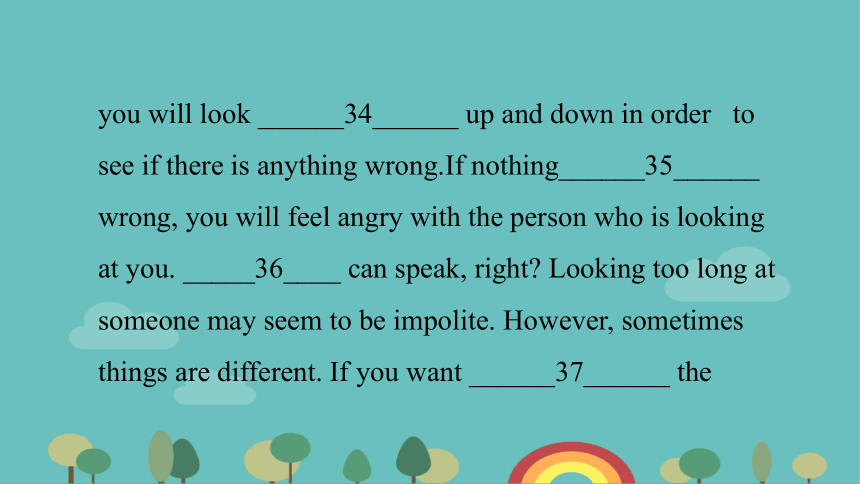
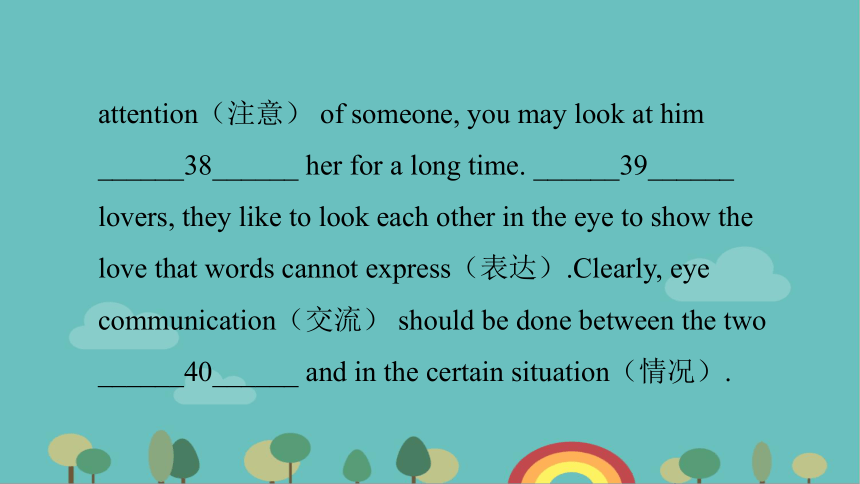
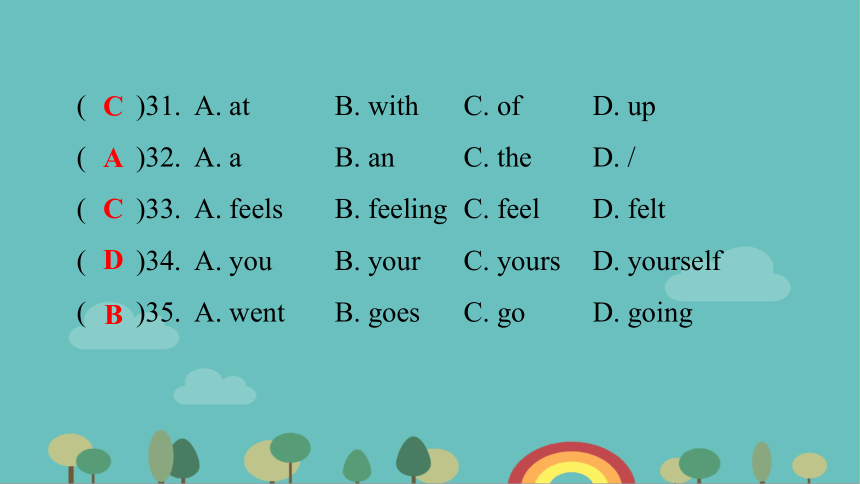
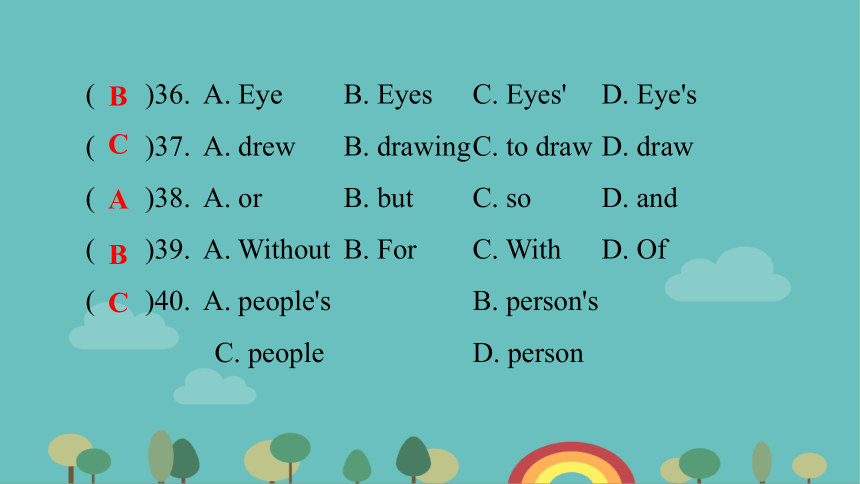
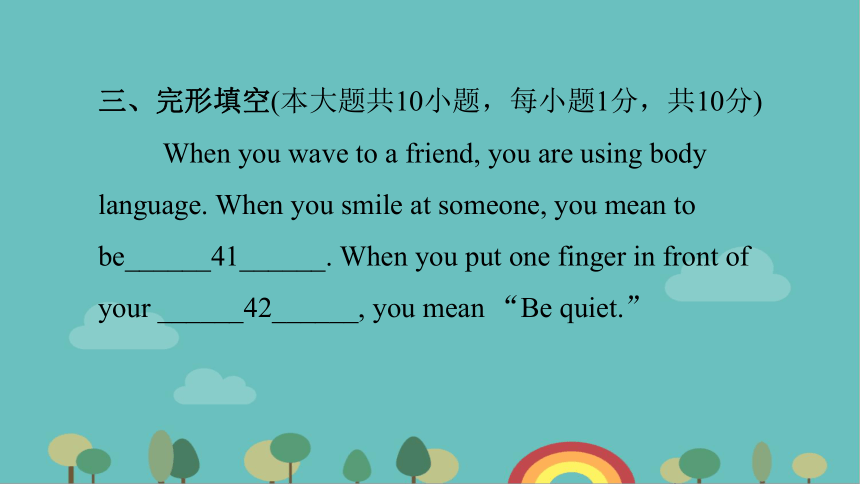
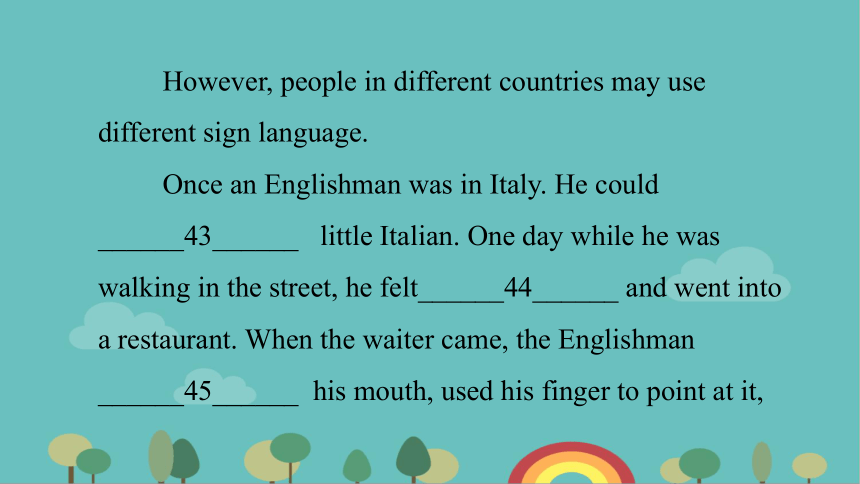

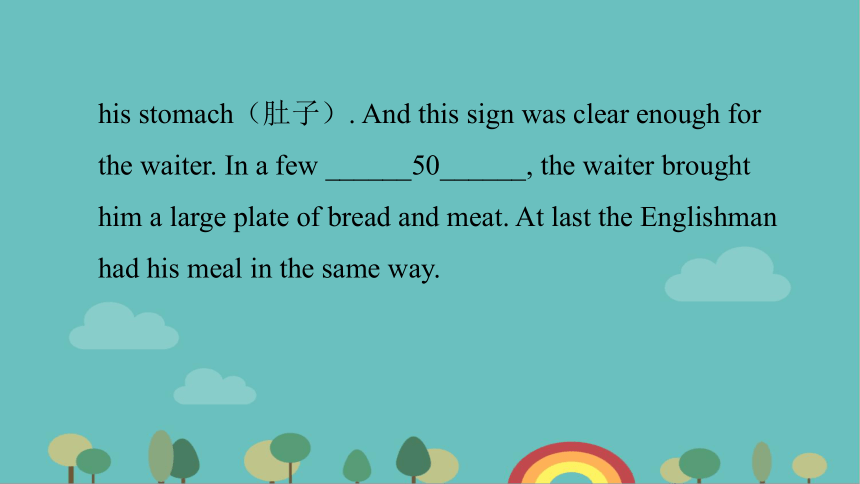
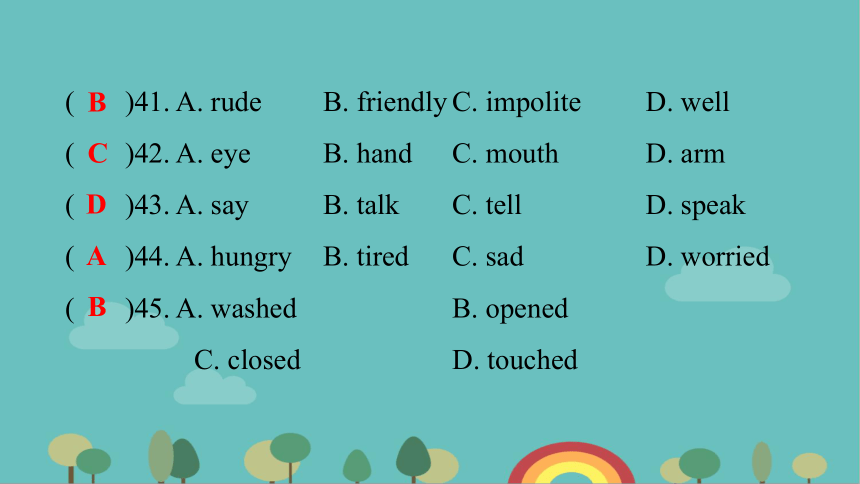
文档简介
(共47张PPT)
Module 11过关训练
一、听力理解(本大题分为A、B、C、D四部分,共30小题,每小题1分,共30分)
(见《听力训练本》)
二、语法选择(本大题共10小题,每小题1分,共10分)
It is often said that eyes can speak.Do you have such kind ______31______ experience On a bus you may look at ______32______ stranger(陌生人), but not too long.If he notices that he is being looked at, he may ______33______ uncomfortable.It is the same in daily life.When someone looks at you several more times,
you will look ______34______ up and down in order to see if there is anything wrong.If nothing______35______ wrong, you will feel angry with the person who is looking at you. _____36____ can speak, right Looking too long at someone may seem to be impolite. However, sometimes things are different. If you want ______37______ the
attention(注意) of someone, you may look at him ______38______ her for a long time. ______39______ lovers, they like to look each other in the eye to show the love that words cannot express(表达).Clearly, eye communication(交流) should be done between the two ______40______ and in the certain situation(情况).
( )31. A. at B. with C. of D. up
( )32. A. a B. an C. the D. /
( )33. A. feels B. feeling C. feel D. felt
( )34. A. you B. your C. yours D. yourself
( )35. A. went B. goes C. go D. going
C
A
C
D
B
( )36. A. Eye B. Eyes C. Eyes' D. Eye's
( )37. A. drew B. drawing C. to draw D. draw
( )38. A. or B. but C. so D. and
( )39. A. Without B. For C. With D. Of
( )40. A. people's B. person's
C. people D. person
B
C
A
B
C
三、完形填空(本大题共10小题,每小题1分,共10分)
When you wave to a friend, you are using body language. When you smile at someone, you mean to be______41______. When you put one finger in front of your ______42______, you mean “Be quiet.”
However, people in different countries may use different sign language.
Once an Englishman was in Italy. He could ______43______ little Italian. One day while he was walking in the street, he felt______44______ and went into a restaurant. When the waiter came, the Englishman ______45______ his mouth, used his finger to point at it,
and then moved his lips(嘴唇). In this way, he said, “______46______ me something to eat.”
But the waiter brought him ______47______ things to drink. First tea, then coffee, then milk, but no food. The Englishman was sorry that he ______48______ tell the waiter he was hungry. He was ready to leave the restaurant when another man ______49______ and put his hands on
his stomach(肚子). And this sign was clear enough for the waiter. In a few ______50______, the waiter brought him a large plate of bread and meat. At last the Englishman had his meal in the same way.
( )41. A. rude B. friendly C. impolite D. well
( )42. A. eye B. hand C. mouth D. arm
( )43. A. say B. talk C. tell D. speak
( )44. A. hungry B. tired C. sad D. worried
( )45. A. washed B. opened
C. closed D. touched
B
C
D
A
B
( )46. A. Take B. Bring C. Get D. Leave
( )47. A. a bit of B. a lot of C. a pair of D. a kind of
( )48. A. wasn't good at B. wasn't good with
C. wasn't able to D. wasn't careful with
( )49. A. came on B. came true
C. came in D. came from
( )50. A. minutes B. hours C. days D. weeks
B
B
C
C
A
四、阅读理解(本大题共15小题,每小题2分,共30分)
A
Nowadays many people go abroad(出国). Then they must learn some customs(习俗) about the country because different countries have different customs. In order that we can learn more about customs, the Culture Palace has invited some foreign speakers to give us speeches(演讲). Here is the timetable.
Table Manners in America Speaker:Mr Smith (From America) Place:Room 1204 in Culture Palace Time:7:30 pm—9:30 pm on Tuesday, 3rd March Ticket Price:25 yuan Who Pays for the Meals in England
Speaker:Mrs White (From England)
Place:Room 3218 in Culture Palace
Time:8:00 pm—10:00 pm on Wednesday, 4th March
Ticket Price:20 yuan
How to Be A Polite Person in Australia Speaker:Mr Brown (From Australia) Place:the Culture Hall Time:7:30 pm—10:00 pm on Tuesday, 5th March Ticket Price:15 yuan Good Manners in Germany
Speaker:Mrs Black (From Germany)
Place:Room 3207 in Culture Palace
Time:7:30 pm—9:00 pm on Friday, 6th March
Ticket Price:20 yuan
( )51. The Culture Palace invites some foreign speakers to give speeches, because ____________.
A. people are interested in Western culture
B. people want to communicate with foreigners more
C. it may make people learn English much harder
D. people should know more about foreign customs
D
( )52. Mr Smith comes from____________.
A. America B. England
C. Australia D. Germany
A
( )53. If you want to go to England on business(出差), you can attend the speech in ____________.
A. Room 1204 in Culture Palace
B. Room 3218 in Culture Palace
C. the Culture Hall
D. Room 320 in Culture Palace
B
( )54. How much is it if someone wants to listen to all the speeches
A. 20 yuan. B. 35 yuan.
C. 60 yuan. D. 80 yuan.
D
( )55. Which of the following is TRUE according to the timetable
A. Mr Smith is going to give a speech on Who Pays for the Meals in England .
B. Mrs White will give a speech in Room 3218 in the Culture Hall on Tuesday.
C. Mr Brown will give the speech How to Be A Polite Person in Australia in the Culture Hall.
D. Mrs Black will give a speech on Good Manners in Germany on 5th March.
C
B
Before you go to another country, it is a great help if you know the language and some of the customs of the country. When people meet each other for the first time in Britain, they say “How do you do ” and shake hands. Usually they do not shake hands when they just meet or say goodbye. But they shake hands after they haven't met for a
long time or when they will be away from each other for a long time. Last year a group of German students went to England for a holiday. Their teacher told them that the English people hardly(几乎不) shake hands. So when they met their English friends at the station, they kept their hands behind their backs. The English students had learned that the Germans shake hands as often as possible, so they put their hands in front and got ready to shake hands with them. It made both of them laugh.
( )56. It is if you know the language and some of the customs of the country.
A. not useful B. not helpful
C. very useful D. very hard
C
( )57. English people usually shake hands when they .
A. meet every time
B. meet for the first time
C. say goodbye to each other
D. say hello to each other
B
( )58. Usually English people don't shake hands .
A. when they will be away for a long time
B. when they say “How do you do ”
C. when they just meet or say goodbye
D. after they haven't met for a long time
C
( )59. Which of the following is TRUE
A. The German students thought that English people hardly shake hands.
B. English people never shake hands.
C. The German students had learned that German people don't like shaking hands.
D. English people and Germans don't shake hands when they meet people.
A
( )60. This story is about .
A. language and customs
B. travelling
C. people in different countries
D. shaking hands
D
C
配对阅读。左栏是五个人在日常社交活动中遇到的问题,右栏是七则专家的建议,请为左栏的每一个人选择最合适的一项,并将其字母编号填写在题号前的括号内。
( )61. My American friends invite me to their dinner party. I don't know what to bring.
( )62. I'm going to a dinner party held by Americans, but I don't know how to use the forks and knives.
( )63. One of my American friends invites me for dinner at eight tonight. Should I arrive early
E
D
C
( )64. An American family invites me to their home for dinner. How can I let the family know that I'm thankful for their kindness after dinner
( )65. I am going to an American friend's party. I'm not sure what to dress. Should I dress formally
F
G
A. Never accept an invitation unless you really plan to go. You can refuse(拒绝) politely.
B. If you accept a dinner invitation of your friend, tell him or her what you like and don't like to eat.
C. You should arrive on time. Don't get there early. If you are going to be more than fifteen minutes late, you should call and tell them.
D. When cutting, hold the fork in your left hand and the knife in your right hand. Then change hands, eat with a fork in your right hand.
E. Flowers are always nice, or you may bring a bottle of wine if you know that your friends drink it.
F. You should thank them for the meal and for their kindness. It's also a good idea to send a thank-you card.
G. Everyday dress is OK for most visits to an American's home.
五、短文填空(本大题共10小题,每小题1.5分,共15分)请阅读下面这篇文章,在所给的每个空格中填入一个形式正确、意义相符的单词。
What do we do if we have something to tell others or if we want ______66______ learn something from the others Yes, we ______67______ our language, that is, either spoken language or written language. ______68______ in fact there is another kind of language
and it is also very important. Do you know what ______69______ is Yes, that is the ______70______ language. Can you tell me something ______71______ body language For example, if you agree with (同意) what I said just now, what do you do And if you don't agree with what I said, ______72______ do you do But sometimes the same gesture (手势) means
______73______ in different countries. For example, in Albania, people nod ______74______ heads doesn't mean “Yes”. So if you ______75______ a foreign country, only speaking its language very well isn't enough (足够的).
66. ________________ 67. _____________
68. _____________ 69. _____________
70. _____________ 71. _____________
72. _____________ 73. _____________
74. _____________ 75. _____________
to
use
But
it
body
about
what
different
their
visit
六、读写综合(本大题分为A、B两部分,共25分)
A. 回答问题(本题共5小题,每小题2分,共10分)
请阅读下面这篇文章,根据所提供的信息,回答5个问题。要求所写答案语法正确、语义完整,并把答案写在横线上。
Hello, I'm Susan from England. Here are some of my pen friends. They're telling something important about customs to you.
I live in Beijing. We usually shake hands when we meet each other for the first time. And I often walk with my friends arm in arm.
—Kate, China
We Americans are very direct(直接的). If we want something, we will say “yes”, but if we don't want it, we will say “no”. When we talk with someone, we look at his or her eyes. We think it is polite.
—Paul, the US
In my country, people don't like touching each other even between friends. But people in my friend Nancy's country touch each other quite a lot.
—Lydia, Norway
I'm from Bulgaria(保加利亚), a country in Europe. In my country, shaking heads doesn't mean “No”. It means “Yes”. So please be careful when you visit my country.
—Martin, Bulgaria
76. Who does Kate often walk with arm in arm
________________________________________________
________________________________________________
77. How do American people think of looking at each other's eyes when talking
________________________________________________
________________________________________________
Kate / She often walks with her friends arm in arm. / Kate's / Her friends.
American people / They think it is polite to look at each other's eyes when talking.
78. In which country do people dislike touching each other
________________________________________________
________________________________________________
79. What's the meaning of shaking heads in Martin's country
________________________________________________
________________________________________________
In Norway, people dislike touching each other. / In Norway.
Shaking heads / It means “Yes” in Martin's / his country.
80. How many people talk about customs in the passage
________________________________________________
________________________________________________
Four / 4 people talk about customs in the passage. / Four / 4.
B. 书面表达(本题15分)
假设你是玲玲,你的外国朋友想了解一些肢体语言在中国的含义。请你用英语写一篇短文向你的外国朋友介绍一下。
作文要求:(1)不能照抄原文;不得在作文中出现学校的真实名称和学生的真实姓名。
(2)语句连贯,词数60个左右。
________________________________________________
________________________________________________
________________________________________________
________________________________________________
________________________________________________
________________________________________________
________________________________________________
Hello, I'm Lingling. I'm Chinese. In China, people wave to say “hello” or “goodbye”. When we want to say “yes”, we nod our heads. We clap our hands to say “you're great”. We bow to say “thank you” to our parents or teachers. We usually shake hands with our new friends. Sometimes, our parents hug and kiss us to say they love us.
THANKS!
Module 11过关训练
一、听力理解(本大题分为A、B、C、D四部分,共30小题,每小题1分,共30分)
(见《听力训练本》)
二、语法选择(本大题共10小题,每小题1分,共10分)
It is often said that eyes can speak.Do you have such kind ______31______ experience On a bus you may look at ______32______ stranger(陌生人), but not too long.If he notices that he is being looked at, he may ______33______ uncomfortable.It is the same in daily life.When someone looks at you several more times,
you will look ______34______ up and down in order to see if there is anything wrong.If nothing______35______ wrong, you will feel angry with the person who is looking at you. _____36____ can speak, right Looking too long at someone may seem to be impolite. However, sometimes things are different. If you want ______37______ the
attention(注意) of someone, you may look at him ______38______ her for a long time. ______39______ lovers, they like to look each other in the eye to show the love that words cannot express(表达).Clearly, eye communication(交流) should be done between the two ______40______ and in the certain situation(情况).
( )31. A. at B. with C. of D. up
( )32. A. a B. an C. the D. /
( )33. A. feels B. feeling C. feel D. felt
( )34. A. you B. your C. yours D. yourself
( )35. A. went B. goes C. go D. going
C
A
C
D
B
( )36. A. Eye B. Eyes C. Eyes' D. Eye's
( )37. A. drew B. drawing C. to draw D. draw
( )38. A. or B. but C. so D. and
( )39. A. Without B. For C. With D. Of
( )40. A. people's B. person's
C. people D. person
B
C
A
B
C
三、完形填空(本大题共10小题,每小题1分,共10分)
When you wave to a friend, you are using body language. When you smile at someone, you mean to be______41______. When you put one finger in front of your ______42______, you mean “Be quiet.”
However, people in different countries may use different sign language.
Once an Englishman was in Italy. He could ______43______ little Italian. One day while he was walking in the street, he felt______44______ and went into a restaurant. When the waiter came, the Englishman ______45______ his mouth, used his finger to point at it,
and then moved his lips(嘴唇). In this way, he said, “______46______ me something to eat.”
But the waiter brought him ______47______ things to drink. First tea, then coffee, then milk, but no food. The Englishman was sorry that he ______48______ tell the waiter he was hungry. He was ready to leave the restaurant when another man ______49______ and put his hands on
his stomach(肚子). And this sign was clear enough for the waiter. In a few ______50______, the waiter brought him a large plate of bread and meat. At last the Englishman had his meal in the same way.
( )41. A. rude B. friendly C. impolite D. well
( )42. A. eye B. hand C. mouth D. arm
( )43. A. say B. talk C. tell D. speak
( )44. A. hungry B. tired C. sad D. worried
( )45. A. washed B. opened
C. closed D. touched
B
C
D
A
B
( )46. A. Take B. Bring C. Get D. Leave
( )47. A. a bit of B. a lot of C. a pair of D. a kind of
( )48. A. wasn't good at B. wasn't good with
C. wasn't able to D. wasn't careful with
( )49. A. came on B. came true
C. came in D. came from
( )50. A. minutes B. hours C. days D. weeks
B
B
C
C
A
四、阅读理解(本大题共15小题,每小题2分,共30分)
A
Nowadays many people go abroad(出国). Then they must learn some customs(习俗) about the country because different countries have different customs. In order that we can learn more about customs, the Culture Palace has invited some foreign speakers to give us speeches(演讲). Here is the timetable.
Table Manners in America Speaker:Mr Smith (From America) Place:Room 1204 in Culture Palace Time:7:30 pm—9:30 pm on Tuesday, 3rd March Ticket Price:25 yuan Who Pays for the Meals in England
Speaker:Mrs White (From England)
Place:Room 3218 in Culture Palace
Time:8:00 pm—10:00 pm on Wednesday, 4th March
Ticket Price:20 yuan
How to Be A Polite Person in Australia Speaker:Mr Brown (From Australia) Place:the Culture Hall Time:7:30 pm—10:00 pm on Tuesday, 5th March Ticket Price:15 yuan Good Manners in Germany
Speaker:Mrs Black (From Germany)
Place:Room 3207 in Culture Palace
Time:7:30 pm—9:00 pm on Friday, 6th March
Ticket Price:20 yuan
( )51. The Culture Palace invites some foreign speakers to give speeches, because ____________.
A. people are interested in Western culture
B. people want to communicate with foreigners more
C. it may make people learn English much harder
D. people should know more about foreign customs
D
( )52. Mr Smith comes from____________.
A. America B. England
C. Australia D. Germany
A
( )53. If you want to go to England on business(出差), you can attend the speech in ____________.
A. Room 1204 in Culture Palace
B. Room 3218 in Culture Palace
C. the Culture Hall
D. Room 320 in Culture Palace
B
( )54. How much is it if someone wants to listen to all the speeches
A. 20 yuan. B. 35 yuan.
C. 60 yuan. D. 80 yuan.
D
( )55. Which of the following is TRUE according to the timetable
A. Mr Smith is going to give a speech on Who Pays for the Meals in England .
B. Mrs White will give a speech in Room 3218 in the Culture Hall on Tuesday.
C. Mr Brown will give the speech How to Be A Polite Person in Australia in the Culture Hall.
D. Mrs Black will give a speech on Good Manners in Germany on 5th March.
C
B
Before you go to another country, it is a great help if you know the language and some of the customs of the country. When people meet each other for the first time in Britain, they say “How do you do ” and shake hands. Usually they do not shake hands when they just meet or say goodbye. But they shake hands after they haven't met for a
long time or when they will be away from each other for a long time. Last year a group of German students went to England for a holiday. Their teacher told them that the English people hardly(几乎不) shake hands. So when they met their English friends at the station, they kept their hands behind their backs. The English students had learned that the Germans shake hands as often as possible, so they put their hands in front and got ready to shake hands with them. It made both of them laugh.
( )56. It is if you know the language and some of the customs of the country.
A. not useful B. not helpful
C. very useful D. very hard
C
( )57. English people usually shake hands when they .
A. meet every time
B. meet for the first time
C. say goodbye to each other
D. say hello to each other
B
( )58. Usually English people don't shake hands .
A. when they will be away for a long time
B. when they say “How do you do ”
C. when they just meet or say goodbye
D. after they haven't met for a long time
C
( )59. Which of the following is TRUE
A. The German students thought that English people hardly shake hands.
B. English people never shake hands.
C. The German students had learned that German people don't like shaking hands.
D. English people and Germans don't shake hands when they meet people.
A
( )60. This story is about .
A. language and customs
B. travelling
C. people in different countries
D. shaking hands
D
C
配对阅读。左栏是五个人在日常社交活动中遇到的问题,右栏是七则专家的建议,请为左栏的每一个人选择最合适的一项,并将其字母编号填写在题号前的括号内。
( )61. My American friends invite me to their dinner party. I don't know what to bring.
( )62. I'm going to a dinner party held by Americans, but I don't know how to use the forks and knives.
( )63. One of my American friends invites me for dinner at eight tonight. Should I arrive early
E
D
C
( )64. An American family invites me to their home for dinner. How can I let the family know that I'm thankful for their kindness after dinner
( )65. I am going to an American friend's party. I'm not sure what to dress. Should I dress formally
F
G
A. Never accept an invitation unless you really plan to go. You can refuse(拒绝) politely.
B. If you accept a dinner invitation of your friend, tell him or her what you like and don't like to eat.
C. You should arrive on time. Don't get there early. If you are going to be more than fifteen minutes late, you should call and tell them.
D. When cutting, hold the fork in your left hand and the knife in your right hand. Then change hands, eat with a fork in your right hand.
E. Flowers are always nice, or you may bring a bottle of wine if you know that your friends drink it.
F. You should thank them for the meal and for their kindness. It's also a good idea to send a thank-you card.
G. Everyday dress is OK for most visits to an American's home.
五、短文填空(本大题共10小题,每小题1.5分,共15分)请阅读下面这篇文章,在所给的每个空格中填入一个形式正确、意义相符的单词。
What do we do if we have something to tell others or if we want ______66______ learn something from the others Yes, we ______67______ our language, that is, either spoken language or written language. ______68______ in fact there is another kind of language
and it is also very important. Do you know what ______69______ is Yes, that is the ______70______ language. Can you tell me something ______71______ body language For example, if you agree with (同意) what I said just now, what do you do And if you don't agree with what I said, ______72______ do you do But sometimes the same gesture (手势) means
______73______ in different countries. For example, in Albania, people nod ______74______ heads doesn't mean “Yes”. So if you ______75______ a foreign country, only speaking its language very well isn't enough (足够的).
66. ________________ 67. _____________
68. _____________ 69. _____________
70. _____________ 71. _____________
72. _____________ 73. _____________
74. _____________ 75. _____________
to
use
But
it
body
about
what
different
their
visit
六、读写综合(本大题分为A、B两部分,共25分)
A. 回答问题(本题共5小题,每小题2分,共10分)
请阅读下面这篇文章,根据所提供的信息,回答5个问题。要求所写答案语法正确、语义完整,并把答案写在横线上。
Hello, I'm Susan from England. Here are some of my pen friends. They're telling something important about customs to you.
I live in Beijing. We usually shake hands when we meet each other for the first time. And I often walk with my friends arm in arm.
—Kate, China
We Americans are very direct(直接的). If we want something, we will say “yes”, but if we don't want it, we will say “no”. When we talk with someone, we look at his or her eyes. We think it is polite.
—Paul, the US
In my country, people don't like touching each other even between friends. But people in my friend Nancy's country touch each other quite a lot.
—Lydia, Norway
I'm from Bulgaria(保加利亚), a country in Europe. In my country, shaking heads doesn't mean “No”. It means “Yes”. So please be careful when you visit my country.
—Martin, Bulgaria
76. Who does Kate often walk with arm in arm
________________________________________________
________________________________________________
77. How do American people think of looking at each other's eyes when talking
________________________________________________
________________________________________________
Kate / She often walks with her friends arm in arm. / Kate's / Her friends.
American people / They think it is polite to look at each other's eyes when talking.
78. In which country do people dislike touching each other
________________________________________________
________________________________________________
79. What's the meaning of shaking heads in Martin's country
________________________________________________
________________________________________________
In Norway, people dislike touching each other. / In Norway.
Shaking heads / It means “Yes” in Martin's / his country.
80. How many people talk about customs in the passage
________________________________________________
________________________________________________
Four / 4 people talk about customs in the passage. / Four / 4.
B. 书面表达(本题15分)
假设你是玲玲,你的外国朋友想了解一些肢体语言在中国的含义。请你用英语写一篇短文向你的外国朋友介绍一下。
作文要求:(1)不能照抄原文;不得在作文中出现学校的真实名称和学生的真实姓名。
(2)语句连贯,词数60个左右。
________________________________________________
________________________________________________
________________________________________________
________________________________________________
________________________________________________
________________________________________________
________________________________________________
Hello, I'm Lingling. I'm Chinese. In China, people wave to say “hello” or “goodbye”. When we want to say “yes”, we nod our heads. We clap our hands to say “you're great”. We bow to say “thank you” to our parents or teachers. We usually shake hands with our new friends. Sometimes, our parents hug and kiss us to say they love us.
THANKS!
同课章节目录
- Module 1 Lost and found
- Unit 1 Whose bag is this?
- Unit 2 Are they yours?
- Unit 3 Language in use
- Module 2 What can you do ?
- Unit 1 I can play the piano
- Unit 2 I can run really fast
- Unit 3 Language in use
- Module 3 Making plans
- Unit 1 What are you going to do at the weekends?
- Unit 2 We're going to cheer the players.
- Unit 3 Language in use
- Module 4 Life in the future
- Unit 1 Everyone will study at home
- Unit 2 Every family will have a small plane.
- Unit 3 Language in use
- Module 5 Shopping
- Unit 1 What can I do for you?
- Unit 2 You can buy everything on the Internet
- Unit 3 Language in use
- Module 6 Around town
- Unit 1 Could you tell me how to get to the Nationa
- Unit 2 The London Eye is on your right.
- Unit 3 Language in use
- Revision module A
- Module 7 My past life
- Unit 1 I was born in a small village.
- Unit 2 I was born in Quincy.
- Unit 3 Language in use
- Module 8 Story time
- Unit 1 Once upon a time….
- Unit 2 Goldilocks hurried out of the house.
- Unit 3 Language in use
- Module 9 Life history
- Unit 1 He left school and began work at the age of
- Unit 2 He decided to be an actor.
- Unit 3 Language in use
- Module 10 A holiday journey
- Unit 1 What did you do?
- Unit 2 This morning we took a walk.
- Unit 3 Language in use
- Module 11 Body language
- Unit 1 They touch noses!
- Unit 2 Here are some ways to welcome them.
- Unit 3 Language in use
- Module 12 Western music
- Unit 1 It's so beautiful!
- Unit 2 Vienna is the centre of European classical
- Unit 3 Language in use
- Revision module B
